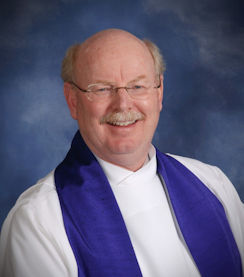This month’s blog, Drinking the Cup, explores the power and politics of a familiar virtue.
REV. JOHN W. BOLEY
Clergy Assistant to the Bishop
 A couple of years ago, when I first joined the Appointive Cabinet as Kalamazoo District Superintendent, David Hills, Dean of the West Michigan Cabinet, suggested that we read a book called Reverence: Renewing a Forgotten Virtue, by Paul Woodruff. He used it in devotions and kindly gave the rest of us a copy of it as a gift.
A couple of years ago, when I first joined the Appointive Cabinet as Kalamazoo District Superintendent, David Hills, Dean of the West Michigan Cabinet, suggested that we read a book called Reverence: Renewing a Forgotten Virtue, by Paul Woodruff. He used it in devotions and kindly gave the rest of us a copy of it as a gift.
I must confess to David that at the time I thumbed through the book, took a mild interest, put it on the shelf with many other books for future reading “when there is time,” and moved on to other things. But over the last few weeks I have picked it up again since there have been such glaring examples of reverence in the world, and the lack thereof.
Reverence is harder to define than we think. Most people, especially we Christians, believe that reverence begins with a specific belief in God. “Our Father, who art in heaven, hallowed be thy name.” So true. But reverence goes beyond a belief in God to the way in which we practice our civil lives. It goes to the awe, respect and shame that we have for life and for others. It has significant vertical dimensions, but its horizontal dimensions are every bit as important.
Reverence is the glue that is a bulwark of society, and has not only a belief in a power higher than ourselves, but has a basic understanding of human limitations. “Simply put, reverence is the virtue that keeps human beings from trying to act like gods.”
Woodruff suggests that reverence is one of the strengths in any good person’s character. The ancient Greeks and the ancient Chinese developed extensive understandings of reverence as a virtue to be developed and practiced. He suggests that “an irreverent soul is arrogant and shameless, unable to feel awe in the face of things higher than itself. As a result, an irreverent soul is unable to feel respect for people it sees as lower than itself – ordinary people, prisoners, children.”
Ironically, Woodruff suggests that reverence has more to do with politics than with religion. While it is grounded in belief in a power higher than one’s self, and seemingly therefore from the religious realm, reverence has more to do with how human beings exercise power with each other. “Power without reverence is a catastrophe for all concerned. Power without reverence is aflame with arrogance … Politics without reverence is blind to the general good and deaf to advice from people who are powerless.”
Without belaboring this any further, I can say that I have seen reverence in so many places recently; in the faces of dedicated nurses in the ICU at UM Hospital; in the caring concern of our United Methodist Connection that has supported my family in prayer and affection; in the dedication of a medical system which despite its flaws serves both the powerful and the powerless – in the ethos that treats all human life as important and of sacred worth.
And we only need to look at our recent election to discover a total lack of reverence – a lack of virtue – that exercises power in a moral vacuum. This presidential election, and our current President elect (regardless of where you stand on party and policy affiliation), have shown a lack of reverence in ways that most of us have only seen in the history books. As a matter of genuine reverence, we should be ashamed.
For followers of Jesus the Christ, the virtue of reverence begins with embracing with all of our might and ability those basic Christian commands — Love the Lord your God with all of your being, and your neighbor as yourself.
Last Updated on November 7, 2023

